How Disabled Creators on TikTok Are Going Beyond "Inspiration Porn"
This story is part of The Beauty of Accessibility, our series on inclusivity and representation for people with disabilities in the beauty industry and beyond.
When people write about this period of self-quarantine in the history books, I don't think it would be fair to ever leave TikTok out of the conversation. Just about everybody has downloaded the app by now: According to an eMarketer report in April, using statistics from Comscore, TikTok added more than 12 million U.S. unique visitors in March, when COVID-19 first hit the U.S. Since then, its numbers have reached 100 million monthly active users in the United States. The app has been a quality source of entertainment, information circulation, and human connection, at a time when people couldn't be together.
In particular, members of marginalized communities began gaining traction on the app, as the whole world was learning to function in a completely different way, listening and paying attention to issues they might have never heard about or taken the time to educate themselves on before. Some creators with disabilities began gaining followers, as a world hungry for something new and exciting began to see a side of disability they had never seen before.
According to a 2012 report from the U.S. Census Bureau, nearly 1 in 5 people have some type of disability. The disabled community is also the only marginalized community that anybody could potentially become a part of at any point in their life.
And yet, so often when people with disabilities would go viral on the internet, the stories were often centered around the dreaded "inspiration porn" or videos or images implying that everything a disabled person does is inspiring to able-bodied people. Although disabled people are capable of doing exceptional things worthy of evoking inspiration in others, this type of content typically emphasizes tasks that would not be inspirational if an able-bodied person did it, like going to the store or simply getting out of bed in the morning. Inspiration porn is damaging to the disabled community because it puts the bar on the floor for what others assume they are capable of.
In addition to being the subjects of inspiration porn, creators with disabilities often find themselves becoming educators, regardless of whether they want to be or not, simply because disability is still so widely misunderstood. Using TikTok gives disabled creators the ability to film themselves doing "normal" things that everyone else is doing: makeup tutorials, talking about dating, cracking jokes, learning viral dances.

Creator Jiya Day, aka @bbjiya, from California who has mild spastic quadriplegia cerebral palsy, got started on TikTok by publishing makeup videos a little over a year ago. At the beginning, her videos — which mainly focused on makeup looks that went along with her e-girl aesthetic — would get fewer than 100 views each, according to Day. She slowly began opening up about her identities outside of makeup artist, talking about her experiences being a Black, bisexual woman with a disability.
"Being an advocate for the disabled community on TikTok kind of blind-sided me," she recalls. "During the Black Lives Matter protests in the summer, I was making a lot of content, bringing attention to everything, and one day, I decided to make a video about the fear that I have as a Black, disabled person in America."
In May of 2020, after she posted a video emphasizing intersectionality, her audience began to grow rapidly and she now has over 100,000 followers. Although Day has experienced an outpouring of support and love, she says sometimes people can be invasive. "I've gotten super invasive questions like 'how do you have sex' and 'how do you use the bathroom;' I'm very much one of those people that try to teach people without telling them too much about my personal life, but it can get a bit tiring at times or creepy," says Day.
Erin Novakowski, a creator with spinal muscular atrophy from Alberta, Canada, cites similar experiences. Known as @wheelierin on TikTok, Novakowski's content consists of everything from crude humor about her disability to makeup transformations with fellow disabled creators, and response videos to the array of comments she gets like the ones Day mentioned, in efforts to educate the misinformed. "I'd describe [my page] as me oversharing about being disabled — but doing it with super cute eyeliner on," Novakowski says.

Erin Novakowski.jpg
In the disabled community, "oversharing is caring" is often the mentality. When you are endlessly made to feel like you are the only person to experience something, you share your experiences in hopes of reaching audience members who are like you and making them feel less alone. Novakowski says she believes her sass and openness about her life allows young disabled girls watching around the world to finally feel some representation. "I love getting a little *spicy* with my content and talking about embarrassing things like getting blackout drunk or getting ghosted by boys, because abled people always assume disabled people don't experience normal things like that," Novakowski says.
"I'd describe [my page] as me oversharing about being disabled, but doing it with super cute eyeliner on."
One of the queens of clapbacks in the community is disabled icon Imani Barbarin, aka @crutches_and_spice, who has cerebral palsy. Since joining the platform, Barbarin has seen TikTok as a window into other people's lives during a time when, due to COVID-19, being near other people was not a possibility for her. Barbarin is known for her tireless advocacy work, incredible sense of humor, and her ability to educate on the disabled community unapologetically.
"We're not going to act like this is okay because you give us the bare minimum of attention and inclusion and stuff like that. No," says Barbarin, explaining her attitude towards society's subtle moves towards inclusivity. "We demand more because we are worth more than what you deem to give us."
Barbarin's content encourages people to not look at disability as one simple definition, but as a multifaceted identity. Her videos consist of topics like "put a finger down, disabled edition,” where she is able to share experiences and educate an able-bodied audience while connecting directly with her disabled viewers and encouraging them to share their truths. Barbarin asserts, "Keep an open mind with disability — disability is not one dimensional, it's not a one-dimensional identity. We are all multidimensional."
This newfound community didn’t come about entirely without issue. In late 2019, leaked TikTok documents obtained by German news site Netzpolitik appeared to show a practice called shadow banning, where a user’s posts may not be viewable to those other than the user. According to Netzpolitik, the guidelines in these documents said these TikTok users were "susceptible to bullying or harassment based on their physical or mental condition," and were trying to reduce exposure to potential cyberbullying by instructing moderators to look for disabled people, people with facial disfigurements, and more."

Imani Barbarin.png
As a result, it was reported that these moderators were instructed to prevent these videos from appearing in TikTok's main video feed once they had reached between 6,000 to 10,000 views. In response to that report, a spokesperson for TikTok confirmed they used to have a cyber-bullying policy and told the BBC, "Early on, in response to an increase in bullying on the app, we implemented a blunt and temporary policy... This was never designed to be a long-term solution, and while the intention was good, it became clear that the approach was wrong." The spokesperson also told the BBC the company had "long since removed the policy in favor of more nuanced anti-bullying policies."
Additionally, a spokesperson for TikTok clarified to Allure that the guidelines referenced in the Netzpolitik and BBC stories were never in place for the U.S. market. "TikTok localizes [Trust and Safety] guidelines for cultural appropriateness in each country. From early 2019, TikTok US had its own head of [T&S] based out of L.A.," says the TikTok spokesperson. Still, reports like this made Day doubt her ability to have a successful TikTok career in the beginning. "I wasn't expecting it to go anywhere because I was small," says Day.
Some creators say they've also faced bullying from other users of the platform. There was a trend circulating for a while on TikTok where a parent would show their child what appeared to be a FaceTime call with their "teacher." The screen where the child believed their teacher was looking back at them, usually had a photo of a person with some kind of facial disfigurement or disability. The apparent purpose of the trend was to capture their "humorous" response of fear or disgust upon realizing what their teacher looked like. Videos like these are harmful to the disabled community because it objectifies us, and the people making the joke forget that it is a real person they are laughing at.
When people with disabilities control the narrative for their own stories, they can tell their own jokes, instead of being used as props.
When people with disabilities control the narrative for their own stories, they can tell their own jokes, instead of being used as props, in a joke that only seems "funny" if you don’t look like the person in the photo. That is why TikTok is so empowering to content creators with disabilities. It amplifies their experiences and gives them a chance to make a joke about their lives, instead of being made into one. If TikTok truly means to eliminate bullying of people with disabilities like they claim, they need to eliminate actual videos of bullying, not gatekeep how disabled people showcase themselves and their own community.
TikTok took down the most famous instance of this trend, which featured motivational speaker and author Lizzie Velasquez. TikTok has noted they do not tolerate content that attacks or incites violence against an individual or a group of individuals on the basis of protected attributes (which includes race, ethnicity, gender identity, serious disease or disability among others), and does not allow content that includes hate speech, and remove it from their platform. In addition, they also suspend or ban accounts that have multiple hate speech violations.

Wil Eaton aka @gentask of California became disabled two years ago, after an accident made him a tetraplegic. He came to TikTok to share his journey and the funny side of disability that people don’t always expect to see when it comes to disability. Eaton’s content consists of dark humor and disability jokes like Elon Musk's lack of accessible vehicles or using trends to make a joke about his disability. For instance when the infamous WAP dance went viral, he posted a video that remixes the song to say, "I said certified truck," zooming out to a video of him in his power wheelchair. The audience response has been overwhelmingly positive. "It’s been a majority just really great support, people really trying to understand. I would say that people like to be educated. Not a lot of people know the ins and outs of disability because it’s not portrayed heavily in the media," Eaton says, "Mostly it's just a lot of support and a lot of love."
"We're not going to act like this is okay because you give us the bare minimum of attention and inclusion. No. We demand more."
A love that also speaks truth to disabled creator Kelly Barendt, or @kellyandfa, from Ohio, who has a rare genetic condition called Friedreich’s ataxia (FA). "I would describe it as an outpouring of love and support for me and my illness. I love being able to reach young women and girls who are going through similar challenges," Barendt says.
Barendt has been able to connect with girls around the world through her makeup and fashion transformation videos, where she encourages women to embrace their differences and celebrate their beauty. Often, kids with disabilities don’t see people who look like them in television and film, and if they do it is typically an able-bodied person portraying a disability. It makes it much harder to appreciate the beauty in yourself when beauty is never presented to you in a relatable context. Barendt says, "People make a lot of broad assumptions about the disabled community, and I absolutely adore anyone who openly defies those stereotypes. I'm a young woman, I'm into skin care, makeup, hair, style and many other things. I also have a disability. Personal interests and disability can co-exist."
There is so much power in owning your own narrative, and it is vital for authentic representation in any community. When you’re a member of the disabled community, often people want to make assumptions about what that means. Being able to control the lens through which we are looked at, something we can do on TikTok, is not always a luxury we have in real life. The views these videos bring in isn’t surprising. Disabled people are funny, hot and intelligent and probably a lot of things you never realized before listening to one. And their content is really effing good.
Read the rest of The Beauty of Accessibility.
All products featured on Allure are independently selected by our editors. When you buy something through our retail links, we may earn an affiliate commission.
Now check out more like this:
Done reading? Watch Saweetie's makeup routine:
Follow Allure on Instagram and Twitter, or subscribe to Allure's newsletter for daily beauty stories delivered right to your inbox.
Originally Appeared on Allure

